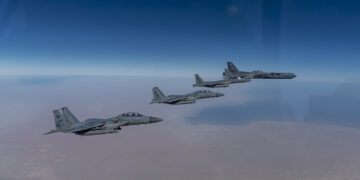FOR IMMEDIATE RELEASE:
November 19, 2025
Contact: press@defensepriorities.org
WASHINGTON, DC—Yesterday, President Donald Trump hosted Saudi Crown Prince Mohammed bin Salman at the White House. Rosemary Kelanic, Director of the Middle East Program at Defense Priorities, issued the following statement in response:
“The U.S.-Saudi defense deals announced during Mohammed bin Salman’s visit are less than meets the eye—and that’s a good thing. The policy headline here is that the U.S. declined to offer Saudi Arabia a security guarantee. That’s good news for the simple reason that protecting Saudi Arabia doesn’t serve U.S. national interests.
“We don’t need to help protect Saudi oil because no single power can dominate the Middle East and dictate oil prices. Smaller disruptions caused by attacks like the 2019 Abqaiq strike can be easily compensated for by the global market. And we don’t need to protect Saudi Arabia to win their favor. Their decisions—on weapons purchases, oil production, and everything else—tend to serve their own interests, not ours, regardless of what we give them.
“What Trump did offer is relatively modest. Designating Saudi Arabia as a Major Non-NATO Ally isn’t meaningless, but does not commit the U.S. to doing anything on their behalf. Lots of countries have MNNA status—including Brazil, Kenya, and Thailand—that are not particularly close to the United States.
“The F-35 sale signals prestige and trust of the Saudis, but little else. The sale itself may not even go through. The U.S. previously approved the sale of F-35s to the UAE but watered down the jets’ capabilities so much to preserve Israel’s qualitative military edge that the UAE ultimately decided against buying them.
“What’s most important is that the U.S. should avoid moves which reinforce the mistaken idea that Saudi security is or should be a U.S. responsibility. The bigger danger lies in exaggerating a purported U.S. ‘commitment’ that doesn’t truly exist.”
More on Middle East

November 4, 2025

November 4, 2025
Events on Middle East







